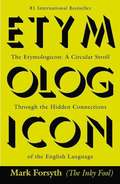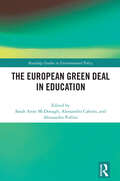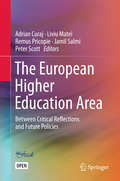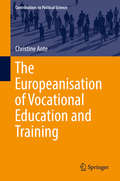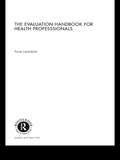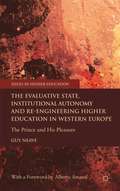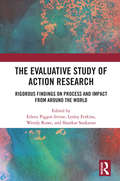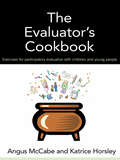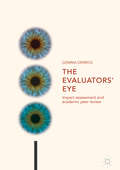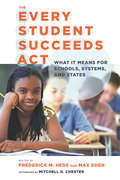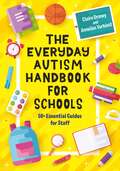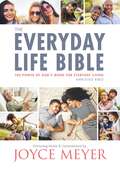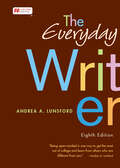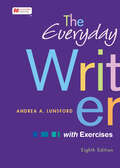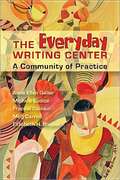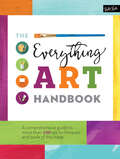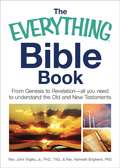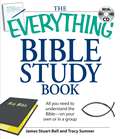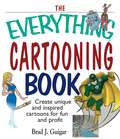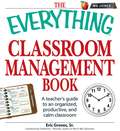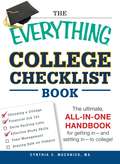- Table View
- List View
The Etymologicon
by Mark ForsythDo you know why... ...a mortgage is literally a death pledge? ...why guns have girls' names? ...why salt is related to soldier? You're about to find out... The Etymologicon (e-t?-'mä-lä-ji-kän) is: *Witty (wi-te\): Full of clever humor *Erudite (er-?-dit): Showing knowledge *Ribald (ri-b?ld): Crude, offensive The Etymologicon is a completely unauthorized guide to the strange underpinnings of the English language. It explains: how you get from "gruntled" to "disgruntled"; why you are absolutely right to believe that your meager salary barely covers "money for salt"; how the biggest chain of coffee shops in the world (hint: Seattle) connects to whaling in Nantucket; and what precisely the Rolling Stones have to do with gardening.
The European Green Deal in Education (Routledge Studies in Environmental Policy)
by Alessandro Caforio Alessandro Pollini Sarah Anne McDonaghThis book shares real-life case studies taken from GreenSCENT, a three-year EU-funded project that promotes sustainability through the development of digital platforms and tools, green education programme, and climate and environmental literacy certification.To date there has been little work published on the application of the European Green Deal in educational programmes and, while environmental education is very dynamic at present, this area has received scant attention. Seeking to remedy this critical omission, this book represents the first application of the Green Deal topics in the classroom. It examines environmental education from an academic perspective, looking specifically at the development of digital tools used to promote sustainability and provides recommendations for their practical application. The authors also discuss ways to engage larger and more diverse audiences (children, young people, and adults across socio-economic, cultural, and ethnic backgrounds) on the topic of sustainability through activities such as air quality monitoring, Climathons, and Youth Assemblies.As the highlighting factors are inclusivity, accessible design, and responsible research and innovation, this volume will be of great interest to students and scholars of European environmental policy and environmental education.
The European Higher Education Area
by Peter Scott Adrian Curaj Jamil Salmi Liviu Matei Remus PricopieBridging the gap between higher education research and policy making was always a challenge, but the recent calls for more evidence-based policies have opened a window of unprecedented opportunity for researchers to bring more contributions to shaping the future of the European Higher Education Area (EHEA). Encouraged by the success of the 2011 first edition, Romania and Armenia have organised a 2nd edition of the Future of Higher Education - Bologna Process Researchers' Conference (FOHE-BPRC) in November 2014, with the support of the Italian Presidency of the European Union and as part of the official EHEA agenda. Reuniting over 170 researchers from more than 30 countries, the event was a forum to debate the trends and challenges faced by higher education today and look at the future of European cooperation in higher education. The research volumes offer unique insights regarding the state of affairs of European higher education and research, as well as forward-looking policy proposals. More than 50 articles focus on essential themes in higher education: Internationalization of higher education; Financing and governance; Excellence and the diversification of missions; Teaching, learning and student engagement; Equity and the social dimension of higher education; Education, research and innovation; Quality assurance, The impacts of the Bologna Process on the EHEA and beyond and Evidence-based policies in higher education. "The Bologna process was launched at a time of great optimism about the future of the European project - to which, of course, the reform of higher education across the continent has made a major contribution. Today, for the present, that optimism has faded as economic troubles have accumulated in the Euro-zone, political tensions have been increased on issues such as immigration and armed conflict has broken out in Ukraine. There is clearly a risk that, against this troubled background, the Bologna process itself may falter. There are already signs that it has been downgraded in some countries with evidence of political withdrawal. All the more reason for the voice of higher education researchers to be heard. Since the first conference they have established themselves as powerful stakeholders in the development of the EHEA, who are helping to maintain the momentum of the Bologna process. Their pivotal role has been strengthened by the second Bucharest conference. " Peter Scott, Institute of Education, London (General Rapporteur of the FOHE-BPRC first edition)
The Europeanisation of Vocational Education and Training
by Christine AnteThis book explores the impact on EU member states of intensified European cooperation in the field of vocational education and training. By employing the Varieties of Capitalism approach as an analytical framework, it seeks to bridge diverging views from an innovative standpoint: While many experts argue that EU policies liberalize national training systems in spite of being 'soft law', Varieties of Capitalism argues that these polices do not produce a convergence of national institutions. The book maintains that European instruments such as the European Qualifications Framework and the European Credit System for Vocational Education and Training are indeed biased towards liberal training regimes. On the basis of case studies on Germany, the Netherlands and England, it shows that the initiatives were implemented in line with national training systems. Thus, European soft law does not lead to a convergence of training regimes - or, as the book posits, of welfare states in general.
The Evaluation Handbook for Health Professionals
by Anne LazenbattThis easy-to-use handbook is a useful resource for all health professionals engaged in processes of evaluation in a variety of contexts within the world of healthcare. Encouraging an evidence-based approach to practice, it provides:* guidelines on how to design and evaluate an intervention* examples of good practice* reliable and easy-to-use measures* advice on how to work effectively.Designed to prompt self-evaluation and group project evaluation, it illustrates how simple evaluation methods can help to break down the divisions between research and practice. It shows how more practitioners can apply such methods to improve the quality of care as well as the treatments and services which they offer their patients and clients. The examples, drawn from clinical settings, community practice and work in the voluntary sector, demonstrate the kind of evaluation that can be undertaken by a small-scale team or a single practitioner with limited resources.The Evaluation Handbook will be a useful source of reference for those new to evaluation as well as more experienced managers and researchers.
The Evaluative State, Institutional Autonomy and Re-engineering Higher Education in Western Europe
by Guy NeaveThis pioneering book examines how policies to raise efficiency and performance in Europe's universities have profoundly altered ties between government, society and higher education, outlining how Evaluation Agencies have urged Europe's universities to meet the challenge of modernization.
The Evaluative Study of Action Research: Rigorous Findings on Process and Impact from Around the World
by Eileen Piggot-IrvineThe Evaluative Study of Action Research presents all eight published papers as part of the six-year, global, Evaluative Study of Action Research (ESAR) in one volume. The study sought to enhance the academic rigour of Action Research (AR) and provide greater evidence of its impact. This research contained in this book shows, in a cohesive way, how the ESAR exemplifies original research incorporating new methodologies to create new knowledge. An Evaluative AR framework and indicators were created for initial qualitative data collection with six initial case studies using interviews, survey, documentary analysis, and Goal Attainment Scaling methods. The initial study was followed by a large-scale mixed method survey with 174 projects from across the globe. Almost all projects exhibited positive elements linked to AR precursors (focus clarification, stakeholder engagement, funding), processes (phased, planned yet flexible activity, data collection and analysis, ongoing collaboration and leadership), and outcomes/impacts (change, knowledge mobilisation and continuing action). The results of the ESAR, elaborated in this volume, offer important indications for how to create the sort of respectful engagement that is required for collective strength in solution based, innovative, change. This book will be a valuable resource for: action researchers throughout the world; postgraduate research students, academics and libraries; evaluators; and anyone in communities who wishes to know how to create sustainable change.
The Evaluator's Cookbook: Exercises for participatory evaluation with children and young people
by Angus McCabe Katrice HorsleyParticipation is a vital element of working with children and young people – ensuring that services are meeting their needs as well as promoting citizenship, resilience and general well-being. The Evaluator’s Cookbook contains 21 participatory evaluation exercises for use with children, young people and families/community groups. Attractively and clearly presented, the exercises are very easy to use and come with suggestions for use and instructions on how to create the equipment needed. They will appeal to a wide range of people and can be used in a variety of informal and formal settings and most of the exercises are suitable for use with disabled children or children with special needs, as well as people with English as a second language. The book also explores why, how and where participatory research and evaluation should take place and provides suggestions on how the findings can be presented in imaginative ways. This unique book is an invaluable resource for those wishing to consult with children and families or evaluate social, health and education services in diverse cultural settings.
The Evaluators’ Eye
by Gemma DerrickThis book offers an empirical analysis of how academic peer review panels mediate the traditionally non-academic criterion of societal impact. The UK’s 2014 Research Excellence Framework (REF2014) for the first time included an “Impact” criterion that considered how research had influenced society, beyond academia. Using a series of interviews with REF2014 Main Panel A evaluators, the book explores how a dominant definition of Impact was constructed within panels and how this led to the development of strategies around valuing it as an ambiguous object. By doing so, Derrick brings a unique perspective to Impact that is currently overlooked in the dominant Impact evaluation discourse. Through examining the evaluation procedure as a dynamic process it is argued that the best models, strategies and insights for Impact evaluation are those constructed in practice, within peer review groups. By exploring the legitimacy of peer review as a tool to assess the societal impact of research, Derrick states that the future for Impact evaluation is not to seek alternative tools where peer review seemingly fails, but instead to highlight ways in which peer review panels can work smarter. The book will be essential reading for students, academics and policy-makers working in Education, as well as researchers interested in peer review processes and the research evaluation frameworks and audit exercises globally.
The Every Student Succeeds Act (ESSA): What It Means for Schools, Systems, and States
by Frederick M. Hess Max EdenIn this foundational book, Frederick M. Hess and Max Eden bring together a cross-section of respected academics and journalists to examine key aspects of the Every Student Succeeds Act (ESSA). This volume provides a thematic and in-depth analysis of the central provisions of this landmark legislation, presenting a range of perspectives. The contributors—leading researchers, policy analysts, and journalists—explore the conflicts and compromises that shaped the emerging law, outline its core provisions, and trace its implications for urban districts, states, and the federal government. Complementing these descriptions are chapters presenting opposing viewpoints on the law’s merits and its ramifications for future reform efforts. Enacted in December 2015, ESSA represents a major shift of the federal role in education, and its provisions touch on almost every aspect of education policy. Yet it arrived in something of a whirlwind, and scholars, advocates, and policy makers are struggling to make sense of this new act. By bringing together leading thinkers to make sense of this important law, The Every Student Succeeds Act provides a solid foundation for scholars, advocates, and policy makers as they begin to navigate a new era in education policy.
The Every Student Succeeds Act: What It Means for Schools, Systems, and States (Educational Innovations Series)
by Frederick M. Hess and Max EdenIn this foundational book, Frederick M. Hess and Max Eden bring together a cross-section of respected academics and journalists to examine key aspects of the Every Student Succeeds Act (ESSA). This volume provides a thematic and in-depth analysis of the central provisions of this landmark legislation, presenting a range of perspectives. The contributors—leading researchers, policy analysts, and journalists—explore the conflicts and compromises that shaped the emerging law, outline its core provisions, and trace its implications for urban districts, states, and the federal government. Complementing these descriptions are chapters presenting opposing viewpoints on the law&’s merits and its ramifications for future reform efforts. Enacted in December 2015, ESSA represents a major shift of the federal role in education, and its provisions touch on almost every aspect of education policy. Yet it arrived in something of a whirlwind, and scholars, advocates, and policy makers are struggling to make sense of this new act. By bringing together leading thinkers to make sense of this important law, The Every Student Succeeds Act provides a solid foundation for scholars, advocates, and policy makers as they begin to navigate a new era in education policy.
The Everyday Autism Handbook for Schools: 60+ Essential Guides for Staff
by Claire Droney Annelies VerbiestA practical, easy-to-read introduction to the ideas and strategies that can be implemented within the classroom to help autistic children achieve their full potential. With an introduction to autism and its key differences, insights from autistic individuals and case studies drawn from years of experience, this is the definitive resource for busy teachers supporting autistic children within a mainstream or specialist school environment.This book provides guidance on a variety of topics related to teaching autistic children in primary school, including adapting the curriculum, ensuring effective communication with staff and parents, fostering emotional regulation, as well as staff self-care. Each chapter includes easy-to-follow guides and resources, providing solutions, direction and support for teachers to help students on the autism spectrum to thrive.
The Everyday Life Bible: The Power of God's Word for Everyday Living
by Joyce Meyer#1 New York Times bestselling author Joyce Meyer's popular study Bible; with practical commentaries, articles, and features that will help you live out your faith, is now available in the New Amplified Version.In the decade since its original publication, THE EVERYDAY LIFE BIBLE has sold 1.1 million copies, taking its place as an invaluable resource on the Word of God. Simultaneously, Joyce Meyer's renown as one of the world's leading practical Bible teachers has grown, as she continues to study and teach daily. This new edition updates Joyce's notes and commentary to reflect the changes made in the revision of the Amplified Bible which refreshes the English and refines the amplification for relevance and clarity. The result is THE EVERYDAY LIFE BIBLE that is now easier to read and better than ever to study, understand, and apply to your everyday life.
The Everyday Writer
by Andrea A. LunsfordThe Everyday Writer equips you to make informed writing choices for your courses, your career, and your community while also providing all of the writing resources you need in an engaging and highly-visual handbook.
The Everyday Writer with Exercises
by Andrea A. LunsfordThe Everyday Writer with Exercises equips you to make informed writing choices for your courses, your career, and your community while also providing all of the writing resources you need in an engaging and highly-visual handbook.
The Everyday Writing Center
by Meg Carroll Anne Ellen Geller Elizabeth H. Boquet Frankie Condon Michele EodiceThe Everyday Writing Center challenges some of the most comfortable traditions in its field, and it does so with a commitment and persuasiveness that one seldom sees in scholarly discussion. The book, at its core, is an argument for a new writing center consciousness--one that makes the most of the writing center's unique, and uniquely fluid, identity. Writing center specialists live with a liminality that has been acknowledged but not fully explored in the literature. Their disciplinary identity is with the English department, but their mission is cross-disciplinary; their research is pedagogical, but they often report to central administration. Their education is in humanities, but their administrative role demands constant number-crunching. This fluid identity explains why Trickster--an icon of spontaneity, shape-shifting, and the creative potential of chaos--has come to be a favorite cultural figure for the authors of this book. Adapting Lewis Hyde and others, these authors use Trickster to develop a theme of ordinary disruptions ("the everyday") as a source of provocative learning moments that can liberate both student writers and writing center staff. At the same time, the authors parlay Etienne Wenger's concept of "community of practice" into an ethos for a dynamic, learner-centered pedagogy that is especially well-suited to the peculiar teaching situation of the writing center. Through Trickster, they question not only accepted approaches to writing center pedagogy, but conventional approaches to race, time, leadership, and collaboration as well. They encourage their field to exploit the creative potential in ordinary events that are normally seen as disruptive or defeating, and they challenge traditions in the field that tend to isolate a writing center director from the department and campus. Yet all is not random, for the authors anchor this high-risk/high-yield approach in their commitment to a version of Wenger's community of practice. Conceiving of themselves, their colleagues, student writers, and student tutors as co-learners engaged together in a dynamic life of learning, the authors find a way to ground the excess and randomness of the everyday, while advancing an ethic of mutual respect and self-challenge. Committed to testing a region beyond the edge of convention, the authors of The Everyday Writing Center constantly push themselves and their field toward deeper, more significant research, and more reflective, dynamic teaching.
The Everything Art Handbook: A Comprehensive Guide to More Than 100 Art Techniques and Tools of the Trade
by Walter Foster Creative TeamPick up your pencil or brush and start creating with this go-to resource for artists of all skill levels, covering drawing, painting, and mixed media.A refreshing, accessible compendium of art materials and techniques, The Everything Art Handbook is the perfect all-inclusive resource for beginning artists wanting to experiment and play with a variety of art mediums and techniques.The Everything Art Handbook is divided into sections focusing on different types of mediums and art concepts. Each section includes a basic overview of the topic, instructions for selecting and working with the right tools and materials, step-by-step sample artwork, and helpful sidebars with advice from professional artists.Expand and refresh your artistic skills with such topics as:Getting started, including how to set up a studio and where to find inspirationArt fundamentals, such as value and light, perspective, and compositionColor basics, including complementary colors, primaries, secondaries, and neutralsDrawing techniques for working with graphite, charcoal, colored pencil, pastel, pen and ink, and morePainting techniques for working with oil, acrylic, and watercolorMixed media tools and techniques, including stamping, encaustics, and texturesUsing clear, informative explanations for achieving the best results, The Everything Art Handbook is an approachable reference guide for contemporary artists of any skill level.
The Everything Bible Book
by Kenneth Brighenti John TrigilioFrom Genesis to Revelation - all you need to understand the Old and New TestamentsFor centuries, the Bible has served as a moral compass and a source of God's word. Packed with stories of mystery, intrigue, and inspiration, the Bible is also valued as sacred literature. Unfortunately, disjointed narratives, confusing language, and an innumerable cast of characters can make reading the Bible a challenge for many people. The Everything® Bible Book is a lucid and richly detailed guide to the history, literature, stories, parables, and personalities of both the Old and New Testaments. From Genesis to Revelations, Abraham to Paul, this book covers the various theories on the origins of the Bible, compares the different editions, and describes in detail the Bible's culture and times. This highly accessible book also includes information on: All the books of the Bible and their content The various translations and versions Interpretations of the Bible through the ages Comparisons of the gospels A book-by-book reading plan Filled with easy-to-follow information and fascinating historical perspective, The Everything® Bible Book is the perfect resource for anyone who wants to unravel and understand the complex mysteries of the Good Book but is intimidated by the prospect.
The Everything Bible Book: From Genesis to Revelation, All You Need to Understand the Old and New Testaments
by John TrigilioFrom Genesis to Revelation – all you need to understand the Old and New TestamentsFor centuries, the Bible has served as a moral compass and a source of God’s word. Packed with stories of mystery, intrigue, and inspiration, the Bible is also valued as sacred literature. Unfortunately, disjointed narratives, confusing language, and an innumerable cast of characters can make reading the Bible a challenge for many people.The Everything® Bible Book is a lucid and richly detailed guide to the history, literature, stories, parables, and personalities of both the Old and New Testaments. From Genesis to Revelations, Abraham to Paul, this book covers the various theories on the origins of the Bible, compares the different editions, and describes in detail the Bible’s culture and times.This highly accessible book also includes information on:All the books of the Bible and their contentThe various translations and versionsInterpretations of the Bible through the agesComparisons of the gospelsA book-by-book reading planFilled with easy-to-follow information and fascinating historical perspective, The Everything® Bible Book is the perfect resource for anyone who wants to unravel and understand the complex mysteries of the Good Book but is intimidated by the prospect.
The Everything Bible Study Book: All you need to understand the Bible--on your own or in a group (Everything® Series)
by James Stuart BellA complete package for individual or group bible study!Studying the Bible can be a daunting prospect—but with The Everything Bible Study Book, reading and understanding this great work has never been easier. This unique, nonsectarian guide has everything you need to study the Bible, either on your own or in the company of your peers. Beginning with an overview of the various methods of Bible study, this fascinating and informative book takes you step by step through the important sections of Scripture, beginning with Genesis and ending with Revelations. Every Scripture reference includes: -Brief summaries of each biblical book -Critical historical and background information -Interpretations relevant to today -Ways to apply Bible teachings to daily life The Everything Bible Study Book provides fifty lessons and discussion topics designed for a full year of Bible study. The accompanying CD includes lesson plans, study guides, readings, and other ready-to-print handouts. Whether you&’re studying solo or starting your own Bible study group to accompany you, you&’ll be ready for the spiritual journey of a lifetime with The Everything Bible Study Book.
The Everything Cartooning Book: Create Unique And Inspired Cartoons For Fun And Profit (Everything® Series)
by Brad J GuigarNo matter what your background, The Everything Cartooning Book is the all-in-one reference to unlock your hidden potential and set you on the fast track toward a rewarding career in cartooning. Professional cartoonist Brad J. Guigar shows you everything from how to create believable characters and effective story lines to writing humor and getting published. This step-by-step guide shows you all the insider techniques and tricks you need to make it in this fun and creative field.Features tips on how to:Show movementCreate cartoons for different genresDevelop your individual styleCraft story linesSell your workand moreWhether you like to draw Manga, create humorous animal characters, or satirize the world around you, The Everything Cartooning Book teaches you all you need to know to successfully follow your artistic dreams.
The Everything Classroom Management Book
by Sr. Eric GrovesThis book provides battle-tested tips on how to become an outstanding educator. Written by a veteran teacher, it's packed with every classroom management secret he discovered in two decades of teaching. Rookies and veterans alike will learn how to: Create the perfect classroom environment Turn defiant students into stellar performers Transform unruly parents into loyal allies Make peace with difficult administrators Increase productivity and learning This is a real-world guide for creating a calm, nurturing, and effective learning environment. Whether they're just out of college or have been teaching for decades, teachers will learn how to survive, thrive, and excel in the classroom.
The Everything Classroom Management Book
by Eric GrovesThis book provides battle-tested tips on how to become an outstanding educator. Written by a veteran teacher, it's packed with every classroom management secret he discovered in two decades of teaching. Rookies and veterans alike will learn how to:Create the perfect classroom environmentTurn defiant students into stellar performersTransform unruly parents into loyal alliesMake peace with difficult administratorsIncrease productivity and learning This is a real-world guide for creating a calm, nurturing, and effective learning environment. Whether they're just out of college or have been teaching for decades, teachers will learn how to survive, thrive, and excel in the classroom.
The Everything Classroom Management Book: A teacher's guide to an organized, productive, and calm classroom
by Eric GrovesThis book provides battle-tested tips on how to become an outstanding educator. Written by a veteran teacher, itÆs packed with every classroom management secret he discovered in two decades of teaching. Rookies and veterans alike will learn how to:Create the perfect classroom environmentTurn defiant students into stellar performersTransform unruly parents into loyal alliesMake peace with difficult administratorsIncrease productivity and learning This is a real-world guide for creating a calm, nurturing, and effective learning environment. Whether theyÆre just out of college or have been teaching for decades, teachers will learn how to survive, thrive, and excel in the classroom.
The Everything College Checklist Book
by Cynthia C. MuchnickMaximize your college experience! The path to higher education is filled with college visits, paperwork, letters of recommendation, essays, and application fees--and that's just to get in! After that comes the financial aid paperwork, student loan notes, scholarship applications, and vouchers--and that's just to pay for it! Then come the roommate compatibility survey, the lists of what to pack, what supplies are need for classes, and the lists go on and on. The Everything College Checklist Book is here to help. These valuable checklists help you keep track of applications, references, transcripts, and financial aid. There are lists of questions to ask potential roommates, what to pack for dorm life, and ideas for the supplies needed for stress-free studying. It's the ultimate guide for making a smooth transition into college life.
